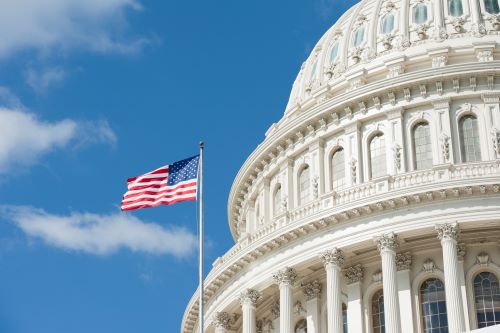Enter your email to receive the CareQuest newsletter:
March 19, 2024
By Melissa Burroughs, Director, Public Policy, CareQuest Institute
Earlier this month, President Joe Biden’s State of the Union Address reiterated the administration's focus on improving the health of people across the country and lowering health costs for our nation’s families. Biden expressed his commitment to protecting health care access, making health insurance and prescription drugs more affordable, defending reproductive health care, and investing in the behavioral health workforce — promises also reflected in his FY 2025 budget proposal released March 12.

CareQuest Institute Director of Public Policy
These priorities keep the door open for continued progress on oral health into 2024 — even if it wasn’t explicitly mentioned in the president’s address. Thanks to the tireless efforts of the oral health community, we’ve seen oral health directly tied into policy discussions around lowering health care costs, improving health, and advancing equity more than ever before. In fact, over the last three years, we’ve experienced some of the most productive and effective policy discussions in decades.
A Commitment to Improving Oral Health Coverage
Thanks to decades of advocacy and engagement by so many dedicated oral health professionals, advocates, educators, and policymakers, we have been closer to major oral health coverage reform in the past several years than ever before.
Our collective action ensured that the Biden administration's transition plan was the first to ever make a commitment to improving oral health coverage for older adults and people with disabilities.
As a result, the administration and numerous members of Congress worked to advance a Medicare dental benefit within the Build Back Better Act, which was nearly passed in 2020 and 2021. This was the first time since the creation of the Medicare program that Congress gave serious consideration to Medicare dental coverage policy. While Congress ultimately passed a slimmed down legislative package that did not include Medicare dental, among other important policies, it remained the most popular policy to be dropped from the package.
In 2022, the Biden administration clarified that Medicare covers “medically necessary” dental coverage, which ensures that Medicare will cover dental services that improve the outcomes of certain covered medical services — a real victory for oral health access. This coverage was strengthened to include additional conditions in 2023.
The momentum continued to build last year when the Senate Finance Committee held a hearing on oral health, the first committee hearing ever on the issue. And for good reason. Recent voter polling shows that support for Medicare dental benefits continues to be incredibly strong: 92% of voters support strengthening Medicare to include dental, vision, and hearing benefits.

In addition to the considerable progress on Medicare dental coverage, in 2021 we also saw the first federal legislation on Medicaid adult dental coverage introduced. This legislation — which aims to establish a federal requirement for state Medicaid programs to provide dental coverage to adults enrolled in the program — has since been reintroduced in the current Congress and included in major equity bills like the Health Equity and Accountability Act.
Beyond Medicare and Medicaid, the administration recently released a proposed regulation that would further increase access to oral health by allowing states to include adult dental benefits in their Essential Health Benefits benchmark plan. This rule has the potential to increase access to oral health benefits for those who get their insurance coverage through the individual and small-group insurance markets, as well as certain other state-based programs.
Each of these legislative and regulatory opportunities have cast a spotlight on the important role oral health can and must play in health policy change. Heading into this election year, it is more important than ever to keep up the momentum.
Three Key Steps to Improving Coverage
This year, we need to work with policymakers to capitalize on immediate opportunities while also laying groundwork for additional policy change in 2025 and beyond.
While current dynamics in Congress will make it hard to pass any major legislation, the administration has several important pathways to continue to improve oral health coverage:
- Make Medicare "medically necessary" dental coverage as robust as possible by continuing to identify additional covered services and ensuring strong implementation of the benefit.
- Finalize regulations that would allow states to make dental coverage more available and affordable through the private marketplace.
- Identify additional opportunities to address and invest in oral health through research and broader health policies.
These solutions are made more urgent by the fact that millions of people have lost their Medicaid medical and dental coverage through the redetermination process that continues to unfold following the end of the COVID-19 Public Health Emergency. Our analysis shows that roughly 14 million people across the country lost Medicaid dental coverage in 2023 as a result of this process.
Looking to 2025 and beyond, we need to keep up our momentum and build more oral health champions in Congress, in the presidency, and in the states to make our goals a reality. The past three years are clear evidence that advocacy efforts can pay off. As we get deeper into this election year, we need to make sure that candidates at all levels and from all parties understand the importance of oral health so that we can keep making progress together.